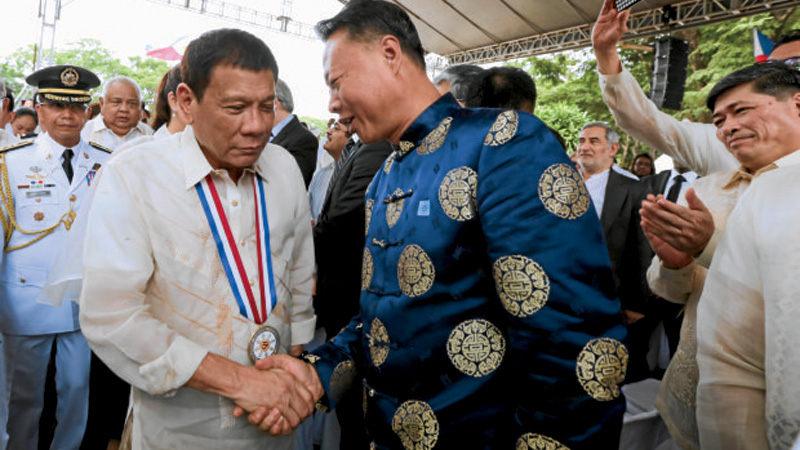PH, China eye intensified trade, financial ties

President Rodrigo R. Duterte shakes hands with Chinese Ambassador to the Philippines Zhao Jianhua during the celebration of the National Heroes’ Day at the Libingan ng mga Bayani in Taguig City on August 29. KING RODRIGUEZ/PPD
MANILA — Despite a maritime dispute in the West Philippine Sea, the Philippines and China want closer trade and financial ties, according to the Department of Finance (DOF).
Specifically, the Philippine and Chinese governments would like to “revitalize” cooperation in five key areas: agricultural trade; bilateral financial cooperation through currency swap; customs; project financing; and tourism, the DOF said in a statement on Monday.
In a courtesy call to Finance Secretary Carlos G. Dominguez III last week, Chinese Ambassador to the Philippines Zhao Jianhua also “offered Beijing’s support to the priority projects of the Duterte administration in the form of official development assistance for pipeline projects of the Departments of Public Works and Highways, Transportation, and Agriculture,” the DOF added.
In response, “Dominguez expressed his appreciation for the ambassador’s offer,” the DOF said.
Finance Undersecretary Maria Editha Z. Tan said the Chinese officials who met with Dominguez “strongly recognized the DOF’s role” in project financing, hence was “looking forward to participate in opportunities to support the administration’s agenda such as infrastructure projects.”
In relation to the Duterte administration’s aim to ramp up infrastructure spending, Chinese officials urged the DOF to fast-track work on the Philippines’ membership in the China-led Asian Infrastructure Investment Bank (AIIB).
“The Chinese ambassador expressed appreciation that the Philippines is taking steps to complete procedures in its membership with the AIIB. The ambassador reiterated the need to complete all steps for full membership in the AIIB so Philippines can access project financing to support its infrastructure requirements,” Tan said. The Philippines’ AIIB membership has been pending as it still needs Senate ratification.
Also, Tan said the DOF and Chinese officials “agreed to revisit current currency swap arrangement to manage foreign exchange risks.”
In terms of project financing, the two sides would explore cooperation in the education, information technology, infrastructure, ports, power, technology and tourism sectors, Tan said.
In agriculture, Tan said “both sides exchanged views on growth potentials in the sector and shared opportunities where the countries can mutually gain benefits, such as the export of Chinese-made agricultural equipment appropriate to the Philippine setting, and expansion of Philippine exports to China such as tropical fruits (such as banana, coconut and pineapple) and high-end marine and fishery products such as lapu-lapu (grouper), bangus, tuna, crabs and shrimps.”
The DOF and Chinese officials also wanted intensified cross-border cooperation through customs, specifically by “addressing reported trade gaps, improving the exchange of information on import and export data, and curbing the entry of illegal drugs from China to the Philippines.”
During the meeting, Zhao “offered to assist in the joint development of tourist areas in the country and expressed interest in establishing the presence of Chinese hotel brands and chains in the country and increasing the number of Chinese tourist arrivals to the Philippines,” the DOF said. SFM
For comprehensive coverage, in-depth analysis, visit our special page for West Philippine Sea updates. Stay informed with articles, videos, and expert opinions.